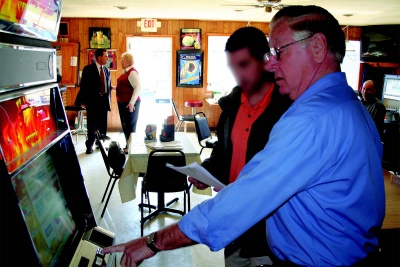
Brass Rail owner Charles Gatton demonstrates the operation of an electronic gaming machine to a Southern Maryland Information Center intelligence officer during last week’s information gathering operation on gambling devices operating in the county. (Photo: Guy Leonard, County Times)
HOLLYWOOD, Md. (March 20, 2008)—St. Mary's County Sheriff Timothy K. Cameron said the legality of electronic gaming devices currently found in local restaurants and bars in St. Mary’s County is still under investigation, but the inquest will not last long.
Cameron told The County Times that owners of establishments hosting the gaming machines – which resemble slot machines – should receive a letter by the end of the week notifying them whether the machines are legal based on an opinion passed down by the State Attorney General’s office early last week.
“That’s the plan right now,” Cameron said in a telephone interview late Monday, adding that “there’s no grace period” in dealing with the machines if they are found to be operating illegally.
Deputy Cindy Allen, spokeswoman for the Sheriff's Office, said business owners could find deputies taking the machines out of their establishments if they refuse to comply with the law.
“They’re expected to comply with the law or enforcement action could take place, up to and including seizure of the machines,” Allen said. “We’re making arrangements for a storage facility… we’re hoping that they’ll either give machines back or do what they need to do to get into compliance.”
The opinion handed down from Attorney General Douglas Gansler’s office March 10 stated that some electronic gaming machines could be illegal based on several facets of law.
Allen said compliance checks showed that several establishment owners operating the machines were not in compliance with one facet of the law or on as many as five.
Those included whether the type of machine was legal, whether the machine was being operated for the benefit of a local charity or qualified organization or how the proceeds from the machines were being disbursed.
Violations were found starting March 13, when sheriff’s deputies, state police investigators and officers from the Maryland Comptroller’s Office began their investigation into the more than 300 machines situated in nearly 30 locations across the county, Allen said.
Investigators worked throughout the weekend to compile a list of which businesses where in compliance.
Cameron said there were 16 establishments still operating the machines last Thursday when the compliance checks started, but about eight either did not have them or had done away with them.
Bob Sorrells, owner of Fred’s Liquors in Charlotte Hall, said he would comply with the orders of law enforcement but he would wait to see what the week brought.
“We’ll hang onto them until we here from the sheriff,” Sorrells said of the machines.
“All my customers keep [asking] why St. Mary’s and not Anne Arundel or Calvert County?
“But we try not to answer much.”
Sorrells was referring to the same kind of machines that have been allowed by law to operate for several years now, but are under siege by a bill supported by Senate President Thomas V. “Mike” Miller (D-Chesapeake Beach).
That bill would eliminate all electronic gaming machines in the state by July 1, save in Anne Arundel and Calvert counties, which would have a grace period.
“There’s too much favoritism being played here,” said Marcello Costa of Impact Games, which owns many of the machines being operated here in St. Mary’s. “Now we’re [St. Mary’s] the black sheep of the pull-tab dispenser saga.
“We don’t get a break.”
Costa said the three manufacturers that operated the machines in Maryland do not produce the machine cited as legal in the Attorney General’s opinion, but the ones being used are authentic pull-tab machines and not slot machines.
The machines had predetermined winners in them in a preset order, Costa said, and did not generate winners inside the mechanism. They also had been put through laboratory tests to show that they were fair.
The machine deemed legal in Chesapeake Amusement v. Riddle in 2001 by the Court of Special Appeals was “like a dinosaur in a machine museum somewhere,” Costa said. “The machines have evolved.”

